-
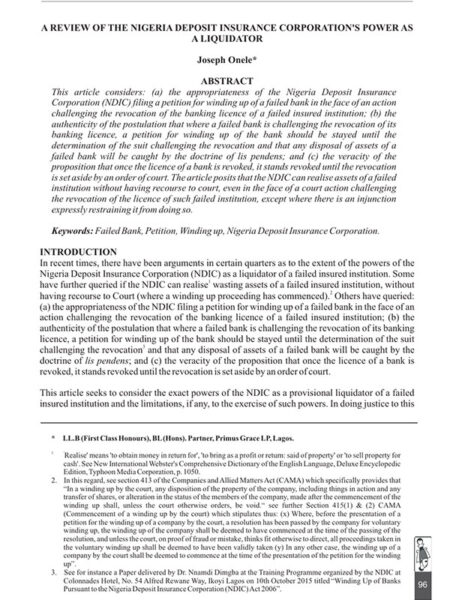
A Review of the Nigeria Deposit Insurance Corporation’s Power as a Liquidator
0₦2,500.00Joseph Onele Partner, Primus Grace LP, in his article, A Review of the Nigeria Deposit Insurance Corporation’s Power as a Liquidator considers the appropriateness of the Nigeria Deposit Insurance Corporation filing a petition for winding up of a failed bank in the face of an action challenging the revocation of the banking licence of a failed insured institution; the authenticity of the postulation that where a failed bank is challenging the revocation of its banking licence, a petition for winding up of the bank should be stayed until the determination of the suit challenging the revocation and the veracity of the proposition that once the licence of a bank is revoked, it stands revoked until the revocation is set aside by an order of court.
-
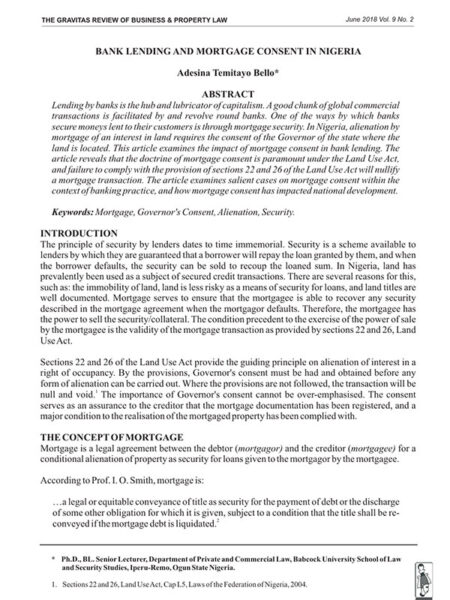
Bank Lending and Mortgage Consent in Nigeria
0₦2,500.00Dr. Adesina Bello, Senior Lecturer, Department of Private and Commercial Law, Babcock University Iperu-Remo in his article, Bank Lending and Mortgage Consent in Nigeria considers the judicial treatment of failure to comply with the provision of sections 22 and 26 of the Land Use Act (LUA) which makes unlawful, and indeed nullifies, any alienation of a right of occupancy without the consent of the Governor first had and obtained. He posits that the restrictive provision of the LUA, and the relative narrow interpretation by the courts may have contributed to the present cumbersome and bureaucratic process of loan documentation, frustration of the concept of securitization, and stifling of the mortgage business in Nigeria.
-
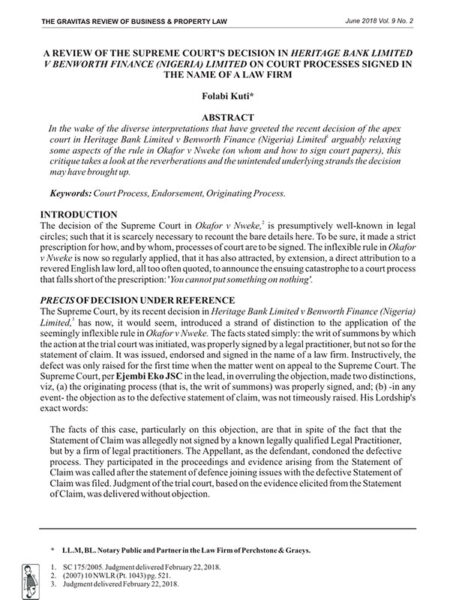
A Review of the Supreme Court’s Decision in Heritage Bank Limited v Benworth Finance (Nig) Ltd on Court Processes Signed in the Name of a Law Firm
0₦2,500.00Folabi Kuti, Partner Perchstone & Graeys, in A Review of The Supreme Court’s Decision in Heritage Bank Limited v Benworth Finance (Nigeria) Limited On Court Processes Signed in the Name of a Law Firm, contemplates the diverse interpretations that have greeted the recent decision of the apex court in the cited case arguably relaxing some aspects of the rule in Okafor v Nweke. Folabi takes a critical look at the reverberations and the unintended underlying strands the decision may have brought up.
-
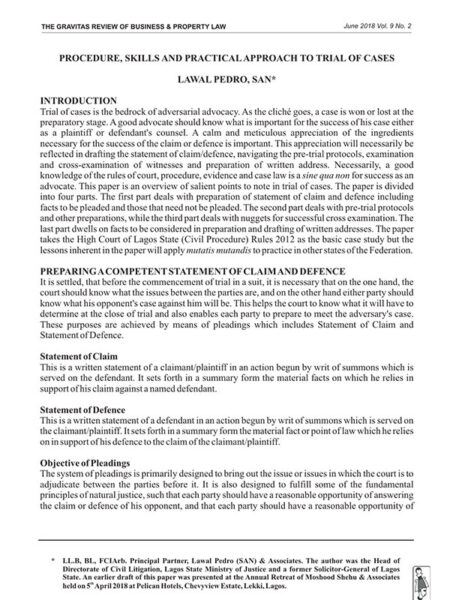
Procedure, Skills and Practical Approach to Trial of Cases
0₦2,500.00Lawal Pedro SAN, Principal Partner, Lawal Pedro (SAN) & Associates and former Solicitor-General of Lagos State in his article, Procedure, Skills and Practical Approach to Trial of Cases, notes that a good knowledge of the rules of court, procedure, evidence and case law is a sine qua non in trial of cases which is the bedrock of adversarial advocacy. Using case law as the framework and the High Court of Lagos State (Civil Procedure) Rules 2012 as the basic case study, he points out important elements in preparation of statement of claim/defence and pre-trial protocols. He gives nuggets for successful cross examination, and facts to consider in drafting good written addresses.
-
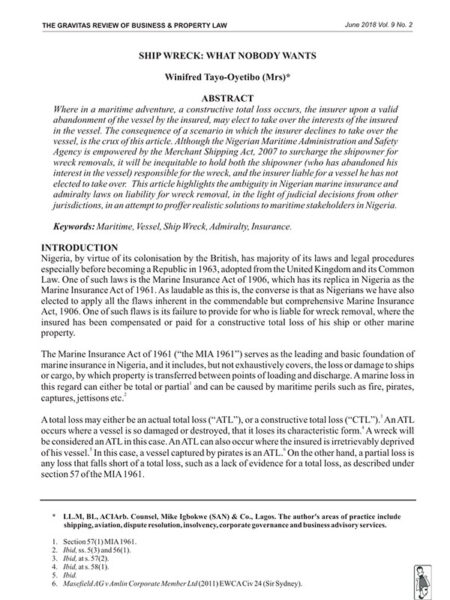
Ship Wreck: What Nobody Wants
0₦2,500.00Winifred Tayo-Oyetibo (Mrs) of Mike Igbokwe (SAN) & Co in her article, Ship Wreck: What Nobody Wants notes that where in a maritime adventure, a constructive total loss occurs, and the insurer having paid the shipowner declines to be saddled with the shipwreck, who then has the responsibility for its evacuation, removal or treatment? Tayo-Oyetibo in a masterly way argues that it will be inequitable to hold the shipowner who has abandoned his interest in the vessel responsible for the wreck, or the insurer who has elected not to take over, liable. She explores the provision of the Marine Insurance Act of 1961 and the 2007 highlighting the ambiguity in the Nigerian laws.
-
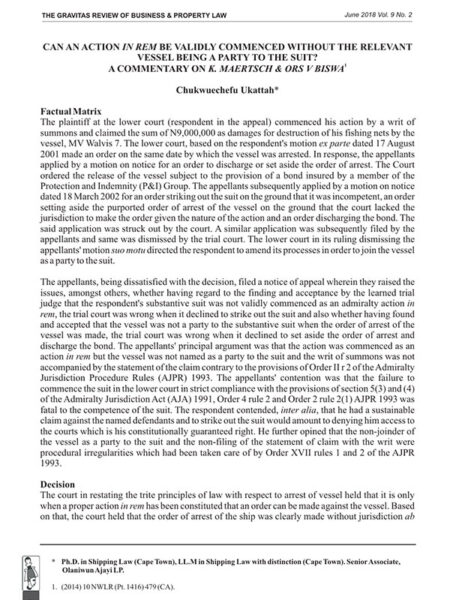
Can an Action In Rem be Validly Commenced Without the Relevant Vessel being A Party to the Suit? A Commentary on K. Maertsch & Ors v Biswa
0₦2,500.00Dr. Chukwuechefu Ukattah, Senior Associate, Olaniwun Ajayi LP asks a pertinent question in: Can an Action in Rem Be Validly Commenced Without The Relevant Vessel Being A Party To The Suit? A Commentary on K. Maertsch & Ors v Biswa. He reviews the decision of the Court of Appeal in the cited case, and using it as a background, explains the different types of admiralty actions and whether a proper action in rem can be constituted without the joinder of the vessel, and whether the non-joinder of the offending vessel in a suit for its arrest, is fatal to the action.
-
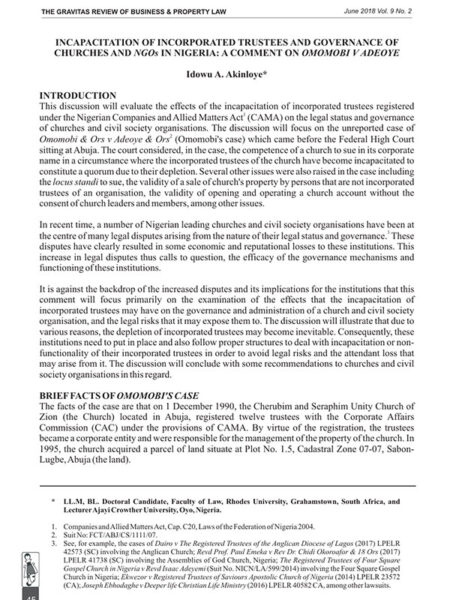
Incapacitation of Incorporated Trustees and Governance of Churches and NGOs in Nigeria: A Commentary of Omomobi v Adeoye
0₦2,500.00Idowu Akinloye, Lecturer Ajayi Crowther University, Oyo and Doctoral Candidate, Rhodes University, Grahamstown, South Africa in his article, Incapacitation of Incorporated Trustees and Governance of Churches and NGOs in Nigeria: A Commentary on Omomobi v Adeoye, examines how a church or civil society organisation may institute legal proceedings or otherwise function where the trustees are all dead, depleted or incapable of functioning.
-
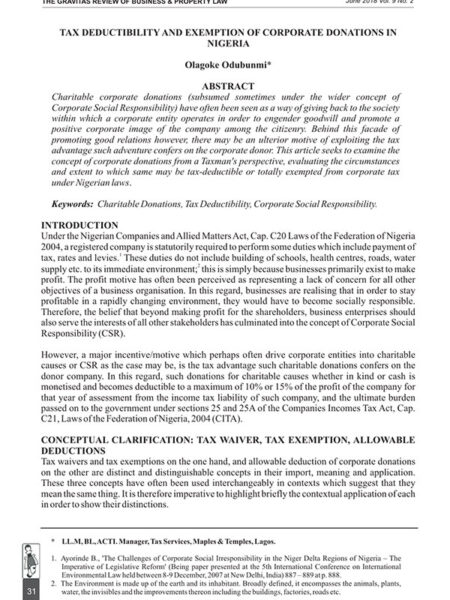
Tax Deductibility and Exemption of Corporate Donations in Nigeria
0₦2,500.00Olagoke Odubunmi, Manager, Tax Services, Maples & Temples, in his paper, Tax Deductibility and Exemption of Corporate Donations in Nigeria, notes that charitable corporate donations (subsumed sometimes under the wider concept of Corporate Social Responsibility) have often been seen as a way of giving back to the society within which a corporate entity operates in order to engender goodwill and promote a positive corporate image of the company among the citizenry. Behind this facade of promoting good relations however, there may be an ulterior motive of exploiting the tax advantage such adventure confers on the corporate donor. Odubunmi examines the legal framework for regulation of corporate donations in Nigeria. He explores the methods of making allowable and tax-deductible corporate donations, and use of charitable trusts as a vehicle for making corporate donations.
-
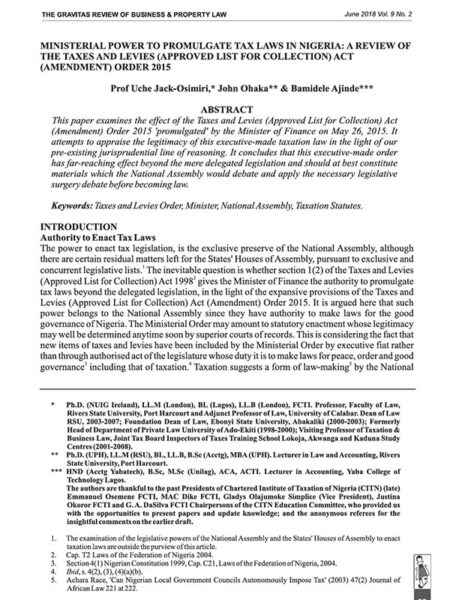
Ministerial Power to Promulgate Tax Laws in Nigeria: A Review of the Taxes and Levies (Approved List for Collection)Act (Amendment) Order 2015
0₦2,500.00Professor Uche Jack-Osimiri, John Ohaka and Bamidele Ajinde in their paper, Ministerial Power to Promulgate Tax Laws in Nigeria: A Review of the Taxes and Levies (Approved List for Collection) Act (Amendment) Order 2015 appraise the legitimacy of the Ministerial Order of 2015 in the light of pre-existing jurisprudential reasoning and case law. They posit that though section 1(2) of the Taxes and Levies (Approved List for Collection) Act 1998 provides that the Minister of Finance, may on the advice of the Joint Tax Board and by Order published in the Gazette, amend the Schedule to the Act, the Amendment Order of 2015 was shoddily done, lacks the necessary legislative rigour, and was most expansive as to belie the concept of delegated or subsidiary legislation.
-
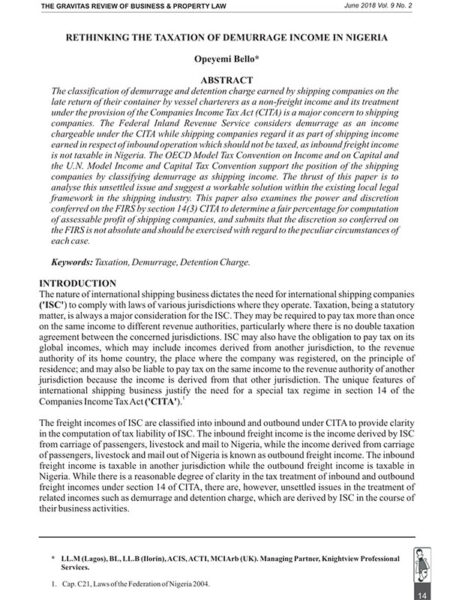
Rethinking the Taxation of Demurrage Income in Nigeria
0₦2,500.00Opeyemi Bello, Managing Partner, Knightview Professional Services in Rethinking the Taxation of Demurrage Income in Nigeria, observes that the classification of demurrage earned by shipping companies on the late return of their containers by charterers as a non-freight income, and its treatment under the provision of the Companies Income Tax Act (CITA) is a major concern to shipping companies; while the Federal Inland Revenue Service (FIRS) considers demurrage as an income chargeable under the CITA, the shipping companies regard it as part of shipping income earned in respect of inbound operation which is not taxable in Nigeria. Bello analyses this unsettled issue, and the discretion conferred on the FIRS by section 14(3) CITA to determine a fair percentage for computation of assessable profit of shipping companies, and suggests a workable solution within the existing legal framework.
-
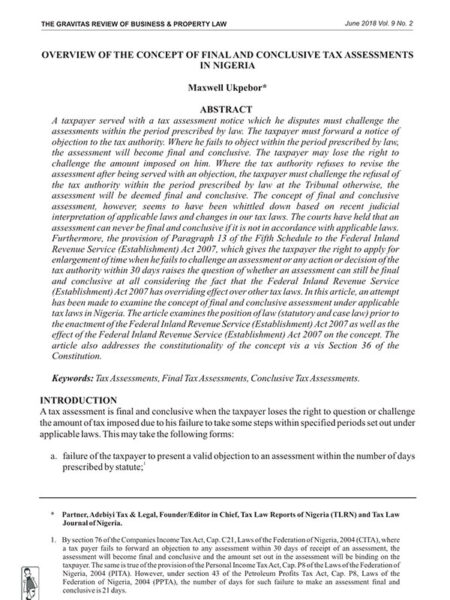
Overview of the Concept of Final and Conclusive Tax Assessments in Nigeria
0₦2,500.00Maxwell Ukpebor, Partner, Adebiyi Tax & Legal, and Editor-in-Chief of Tax Law Reports of Nigeria in his paper, Overview of the Concept of Final and Conclusive Tax Assessments, notes that a taxpayer served with a tax assessment which he disputes must challenge the assessment within the period prescribed by law otherwise the assessment becomes final and conclusive. He examines the constitutionality of the concept of final and conclusive tax assessment in Nigeria, the position of law (statutory and case law) prior to the enactment of the Federal Inland Revenue Service (Establishment) Act 2007, as well as the effect of the FIRS Act on the concept.
-
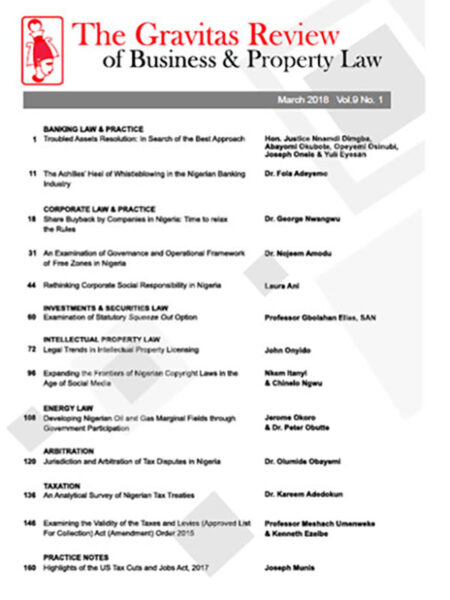
The Gravitas Review of Business & Property Law Vol.9 No.1 – Print
0₦5,000.00In this issue of The Gravitas Review of Business & Property Law Vol.9 No.1, there are well researched articles on:
- Banking Law & Practice
- Corporate Law & Practice
- Investments & Securities Law
- Intellectual Property Law
- Energy Law
- Arbitration
- Taxation
- Practice Notes
The Gravitas Review of Business & Property Law



